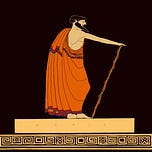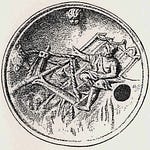Odyssey 2.323-434 (end)
Since I started again after my illness, I’ve now spent two years without performing past Book 4 of the Odyssey. Now, I have translated the whole thing in that time, to be fair; and I am a self-confessed Homerist, so there is endless fascination for me in every part of every line. But this does mean that I have not yet encountered Odysseus himself. Homer does not make you wait two years, but he does make you wait four books, a pretty long time. An ongoing question, raised by modern critics—the ancients seem not to have complained—is does the Telemachy (Books 1-4) cut it? Does Telemachus sustain our interest? Why does Homer delay the introduction of his hero? Or does he in fact? Subscribers, do please respond in comments or over in Chat.
I shall admit it is hard to square the master fabulist of Books 5-12, and the Hollywood storyteller of 16-24—meant in a good way—a novelist who writes a real page-turner—with the relaxed buildup of Telemachus’ situation in Ithaca at the beginning of the Odyssey. There is also an apparent lull when Odysseus first arrives in Ithaca—Books 13-15—filled with conversations, and many lies, in the lowly dwelling of Eumaeus the swineherd. Coming up in Book 3, Nestor will literally talk until the sun goes down. How does one understand these two apparent lulls, one which sets in right at the beginning, and the other which interrupts sequences of (to us) intense mythic and dramatic interest? The Tale of Odysseus’ Wanderings and the Plot Against the Suitors and the Reunion with Penelope?
The oral theory of Homeric composition allows us to shunt all aesthetic questions to a mysterious primitive realm beyond our ken or ability to participate. Let us avoid this ungrounded laziness. Plato’s world was not infected with the fascination for orality. It was, however, keenly insightful into the qualities of poetry and aesthetic craft, and it does not seem to register a problem with any parts of the Odyssey on these grounds. Perhaps occasional doldrums are a part of the rhythm of sea journeys and traveller’s tales? But it may be our own predilections for mythic tales of (super)heroes, or for the dramatic dovetailing of storylines to a climax, which are distorting our sense for those parts of Homer’s art which do not aim to satisfy those kinds of arousal.
I do love the ship cleaving through the water. It is such a release, felt in the rhythms, when the journey finally gets underway. By itself that is a clue to how effectively Homer has conjured the feeling of adolescent inertia and its privileged frustrations, the invisible bonds that tie young men to their dice and tables, and leave the loyal, experienced men, and all the women, with a choice of service also to their appetites, or to a now distant memory of an ideal from their youth which may or may not be dead forever. Bring me a traveller’s wind!
In Greek:














Traveller’s Wind: Homer in English